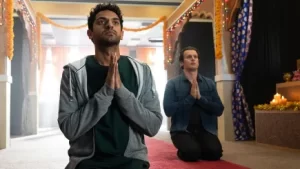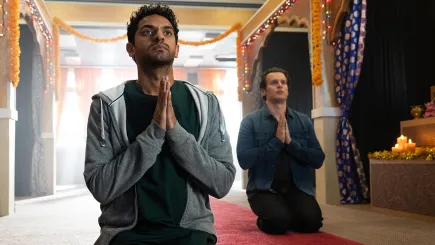In an era where mainstream cinema often gravitates towards grandiose narratives and larger-than-life spectacles, “A Nice Indian Boy” emerges as a refreshing breath of authenticity, offering audiences a poignant and heartfelt exploration of love, identity, and family dynamics within the framework of a charming gay rom-com. Directed by Roshan Sethi and featuring a talented ensemble cast led by Karan Soni and Jonathan Groff, this film transcends genre conventions to deliver a cinematic experience that is as emotionally resonant as it is entertaining. Let’s find out with Whoworlds.

At the heart of the story lies Naveen, portrayed with nuance and sensitivity by Karan Soni, a shy and introspective Indian American doctor whose evenings are spent recording messages to former flings in a futile attempt to fill the void in his life. Despite his professional success, Naveen finds himself yearning for deeper connections and a sense of belonging that has eluded him thus far.
Enter Jay, portrayed with magnetic charm by Jonathan Groff, a confident and free-spirited photographer whose infectious energy and irreverent humor captivate Naveen from their very first encounter. Their initial meeting at a Hindu temple sets the stage for a whirlwind romance that defies expectations and challenges societal norms, as Naveen grapples with the complexities of his burgeoning feelings for Jay and the implications of their interracial and intercultural relationship.
See more: Celebrating the Life and Legacy of Michael Culver: A Journey Through the Galaxy and Beyond
As their relationship blossoms, “A Nice Indian Boy” navigates the intricacies of love and identity with grace and poignancy, exploring themes of acceptance, authenticity, and the struggle to reconcile personal desires with familial expectations. Naveen’s journey, in particular, serves as a compelling focal point as he confronts the cultural divide between his traditional Indian upbringing and his desire to forge his own path in life.

The film’s narrative unfolds against the backdrop of Naveen’s interactions with his family, a colorful ensemble of characters whose well-meaning intentions often clash with their own insecurities and prejudices. From his well-intentioned but overbearing mother, Megha, portrayed with warmth and humor by Zarna Garg, to his stoic and traditional father, Archit, brought to life with understated gravitas by Harish Patel, Naveen’s family provides both comic relief and poignant moments of introspection as they navigate the complexities of their relationships with one another.
One of the film’s greatest strengths lies in its portrayal of the bond between Naveen and Jay, which unfolds with authenticity and sincerity thanks to the chemistry between Soni and Groff. Their interactions are imbued with genuine warmth and affection, capturing the essence of a budding romance with honesty and vulnerability. From their playful banter to their tender moments of intimacy, Naveen and Jay’s relationship serves as the emotional anchor of the film, grounding its narrative in a sense of genuine emotion and connection.
However, “A Nice Indian Boy” is not content to simply explore the complexities of romantic love; it also delves into the intricacies of familial and platonic relationships with equal depth and sensitivity. From Naveen’s interactions with his married sister, Arundhathi, portrayed with wit and charm by Sunita Mani, to his friendships with his coworker, Paul, portrayed with comedic flair by Peter S. Kim, and his various encounters with extended family members and friends, the film paints a rich tapestry of human connection that resonates long after the credits roll.
Yet, for all its heartfelt storytelling and poignant character dynamics, “A Nice Indian Boy” is not without its flaws. The film’s pacing occasionally feels rushed, particularly in its treatment of Jay’s character, whose narrative arc often feels overshadowed by Naveen’s. Additionally, while the film tackles important themes surrounding identity and acceptance, it occasionally falls into the trap of relying on clichés and stereotypes, detracting from its overall impact.

Despite these minor shortcomings, “A Nice Indian Boy” ultimately succeeds in delivering a cinematic experience that is as entertaining as it is emotionally resonant. Through its winning performances, heartfelt storytelling, and universal themes of love, identity, and belonging, the film transcends genre conventions to offer audiences a captivating and thought-provoking exploration of the human experience.
In conclusion, “A Nice Indian Boy” is a triumph of modern cinema, a film that celebrates the beauty of love in all its forms and embraces the complexities of identity and belonging with warmth, humor, and sincerity. With its authentic portrayal of diverse characters and its poignant exploration of universal themes, this film stands as a testament to the power of storytelling to unite audiences and bridge cultural divides in an increasingly divided world.
See more: Mount Fuji introducing visitor cap and entry fee to target overcrowding issues

